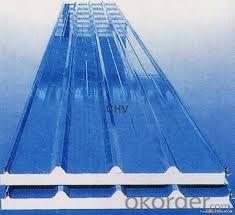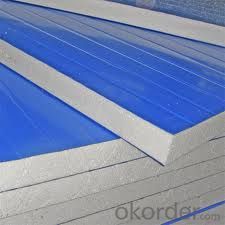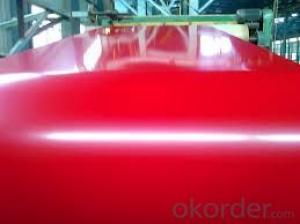Pre-Painted Galvanized Steel Roofing Sheet PPGI/Pre-painted Galvanized Steel Coil
- Loading Port:
- China main port
- Payment Terms:
- TT OR LC
- Min Order Qty:
- 25 m.t.
- Supply Capability:
- 1000 m.t./month
OKorder Service Pledge
OKorder Financial Service
You Might Also Like
Product Description
0.4mm/0.45mm/0.47mm/0.5mm Pre-Painted galvanized Steel Roofing Sheet PPGI
Painting: Polyester(PE) PVDF
Standard: ASTM, JIS,AISI, GB
Grade: SGCC.SPCC.DC51D,DC52D,DC53D
thickness: 0.2mm---1.0mm
Width: 914mm,1000mm, 1200mm, 1250mm, 1500mm or as your request
Zinc coating: 40-250g/m2
Color: Ral code or as the client request
Packing: wooden with the waterproof paper
Delivery: 4 weeks
MOQ: 5tons or negotiable
Applications
1) Refrigerator, washer, switch cabinet, instrument cabinet, air conditioning, micro-wave oven, bread maker
2) Exterior applications such as: Wall cladding, facades, roofs and canopies, tunnels, column covers or renovations
3) Interior applications such as: Wall cladding, ceilings, bathrooms, kitchens and balconies


Brand Name | CNBM |
Product Name | PPGI / PPGL (PCM) |
Thickness of Base Metal | 0.2~0.8mm |
Painting material | Polyester(PE) PVDF epoxy |
Painting Thickness | 7~30μm |
Surface Protection | PE protective film |
Color | Ral code or as the client request |
Surface Treatment | Degreasing and chemical treatment |
Gloss | 5-105% |
Coating Hardness (pencil resistance) | ≥H |
Flexibility (T-bend) | ≤2T |
MEK resistance | More than 100 |
Supplying Status | Sheet: Width≤2000mm,Length≤5000mm |
Coil: Width≤2000mm,N.W≤5T,Inner Diameter: φ408mm φ505 φ508 | |
Application | Home appliance: Refrigerator shutter & side panels, Washer, Freezers, Air conditions, Rice Cooker, Microwave Ovens, Water Heaters, Sterilization Cabinets, Range Hoods Computer Panels , DVD/DVB panels, TV back panel etc. |
- Q:How are steel coils used in the production of steel screws?
- Steel coils are used in the production of steel screws as they serve as the raw material for manufacturing the screws. The steel coils are unwound and fed into a machine that cuts and shapes the steel into the desired screw form. This process ensures that the screws are made from high-quality steel and have the necessary strength and durability.
- Q:What types of steel are used in steel coils?
- There are various types of steel that are commonly used in steel coils, including carbon steel, stainless steel, and alloy steel.
- Q:I don't know why but I'm having a VERY difficult time finding the melting point of 1008 steel.
- It is still the same for 1008 steel. Go to the bottom and see the listing of the grades it covers. Since the only difference between the 1006 and 1008 steel is a few micro amounts of alloys and by far the greatest majority or main component is iron (99%), as a general melt temperature , 2750 F is the melt temperature at which the other alloys are added to the charge to fine tune the mix. Just like adding salt to distilled water actually lowers the boiling point of water, adding alloys to iron decreases the melting point of iron. The iron melts at 2800F, but once alloys to make the 1008 grade are added, it decreases melt temp to 2750F. Since the melting point of pure iron is 2800F, the temperature is actually decreased by adding these impurities of alloys. These alloys are tested while the mix is starting to come down from a pure melt, steel is sampled. and then alloys below are checked and added to make the 1008 steel. The steel is maintained at 2750 F so that the less volatile alloys don't boil off before combining with steel. Minimum Properties Ultimate Tensile Strength, psi 43,900 - 51,900 Yield Strength, psi 26,100 - 34,800 Elongation 42 - 48% Chemistry Iron (Fe) 99% Carbon (C) 0.08% Manganese (Mn) 0.6% max Phosphorus (P) 0.035% max Copper (Cu) 0.2% min Sulfur (S) 0.04%
- Q:What are the common size limitations for steel coil production?
- The size limitations for steel coil production can vary based on various factors, including the type of steel used, the manufacturing process, and the available equipment. However, there are generally accepted size limitations in the industry. One primary constraint is the width of the steel coil, which is typically determined by the size of the rolling mill or slitting equipment used in production. Standard widths for steel coil production range from approximately 600 millimeters (23.6 inches) to 2,000 millimeters (78.7 inches). Nonetheless, specialized equipment and processes can achieve widths outside of this range. Another limitation is the thickness of the steel coil, which can be influenced by the type of steel, intended application, and manufacturing capabilities. Common thicknesses for steel coils range from 0.15 millimeters (0.006 inches) to 6 millimeters (0.236 inches). However, specialized equipment and processes may be required to produce thicker or thinner coils. The weight of the steel coil is also an important consideration, typically determined by the capacity of production and handling equipment, as well as transportation limitations. Standard coil weights range from a few hundred kilograms to several tons. However, larger equipment or dividing the coil into smaller coils can enable the production of coils that exceed these limits. In addition to width, thickness, and weight, there may also be limitations on the length of the steel coil. This can be influenced by factors such as the size of the production line, handling and transportation capabilities, and customer requirements. Standard coil lengths typically range from a few meters to several tens of meters. However, specialized equipment and processes can produce longer coils. It is important to note that these size limitations are not fixed and can vary depending on project or customer requirements. Manufacturers often collaborate closely with customers to determine the optimal size limitations for their steel coil production, ensuring the final product meets desired specifications.
- Q:What is the AISI grade of mild steel that is the most magnetic? What magnetic steels are the cheapest and easiest to buy?
- Iron
- Q:Can steel coils be stored in a corrosive environment?
- No, steel coils should not be stored in a corrosive environment as it can lead to the degradation of the steel surface and compromise its structural integrity.
- Q:what do we use steel for and whyand why do we use brass for instrumentsplz help its homework and i cant find the answer anywhere : (
- By instruments do you mean musical instruments? Brass is used for musical instruments because it's strong but very malleable. It's easy to hammer and roll into sheets, or form into tubes and complex shapes. It's easy to work with using hand tools. It's also very corrosion resistant and polishes very well. It has an attractive gold-like color. It also has some effect on sound, though the shape and design of an instrument is much more important to the sound than the material that's used. Apart from musical instruments, brass is used for items that need to be both durable, easy to manufacture, and resistant to the elements. For example plumbing items like valves and screw couplings.brass is a lot easier to cut with machine tools than steel. It's also traditionally used for hardware on doors and cabinets because of it's color, low friction properties, and corrosion resistance. Brass also is toxic to bacteria, and so brass doorknobs disinfect themselves after about 9 hours. Steel is very strong and very cheap. Steel is basically iron with a small amount of carbon added which makes it much stronger. Iron is the fourth most common element in the earth's crust, after oxygen, silicon, and aluminum. Brass being a mixture (an alloy) of copper and zinc, with other metals sometimes added. Copper and zinc are the 27'th and 26'th most common elements. Therefore, it make sense that brass is much more expensive than steel. Steel is used for too many things to be listed. The use of steel technology has impacts on almost every aspect of modern life. Nearly all of the man-made objects you touch on a regular basis were made using steel tools and steel machinery.
- Q:What are the common coil slitting methods?
- The common coil slitting methods include rotary shear slitting, loop slitting, and single-knife slitting.
- Q:How many types of steel buildings are there?
- There are a number of designs which can be used to create different types of steel buildings as per the demands of the buyer or an investor. he various kinds of that can be constructed using steel are Homes, Hangars, Agriculture and Farm buildings for storage, Garages and Storage sheds, Open air sheds,, Barns, Arenas and stadiums, Automotive buildings with overhead doors and flexible framed openings, Religious buildings such as Churches and Temples, etc.
- Q:I already have the county permits and bank loan, but the foundation hasn't been poured. Is it too late to convert to steel?
- Steel is going to be a whole different world. You will need to go back to square one and get house plans that are drawn for structural steel. First thing you need to do is find a builder that knows how to build with steel and get an idea of the price.
1. Manufacturer Overview |
|
|---|---|
| Location | |
| Year Established | |
| Annual Output Value | |
| Main Markets | |
| Company Certifications | |
2. Manufacturer Certificates |
|
|---|---|
| a) Certification Name | |
| Range | |
| Reference | |
| Validity Period | |
3. Manufacturer Capability |
|
|---|---|
| a)Trade Capacity | |
| Nearest Port | |
| Export Percentage | |
| No.of Employees in Trade Department | |
| Language Spoken: | |
| b)Factory Information | |
| Factory Size: | |
| No. of Production Lines | |
| Contract Manufacturing | |
| Product Price Range | |
Send your message to us
Pre-Painted Galvanized Steel Roofing Sheet PPGI/Pre-painted Galvanized Steel Coil
- Loading Port:
- China main port
- Payment Terms:
- TT OR LC
- Min Order Qty:
- 25 m.t.
- Supply Capability:
- 1000 m.t./month
OKorder Service Pledge
OKorder Financial Service
Similar products
New products
Hot products
Related keywords





























